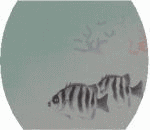 「At last came Peiwoh, the prince of harpists.
「At last came Peiwoh, the prince of harpists.
With tender hand he caressed the harp as one might seek to soothe an unruly horse, and softly touched the chords.
He sang of nature and the seasons, of high mountains and flowing waters, and all the memories of the tree awoke!
Once more the sweet breath of spring played amidst its branches.
The young cataracts, as they danced down the ravine, laughed to the budding flowers.
Anon were heard the dreamy voices of summer with its myriad insects, the gentle pattering of rain, the weil of the cuckoo.
Hatk! a tiger roars,-the valley answers again.
It is autumn; in the desert night, sharp like a sword gleams the moon upon the frosted grass.
Now winter reigns, and through the snow-filled air swirl flocks of swans and ratling hailstones beat upon the boughs with fierce delight」(From the Book of Tea-Art Appreciation, pp.76-77, Charles E. Tuttle Co., Rutland, Vermont, Tokyo, Japan)
The facts mean the resonance with nature is the most critical.
The harp will not sing if you are trying to play, but will sing if you are trying to enjoy the nature and seasons with harp.
Image Designer: Izumi Mori
No comments:
Post a Comment